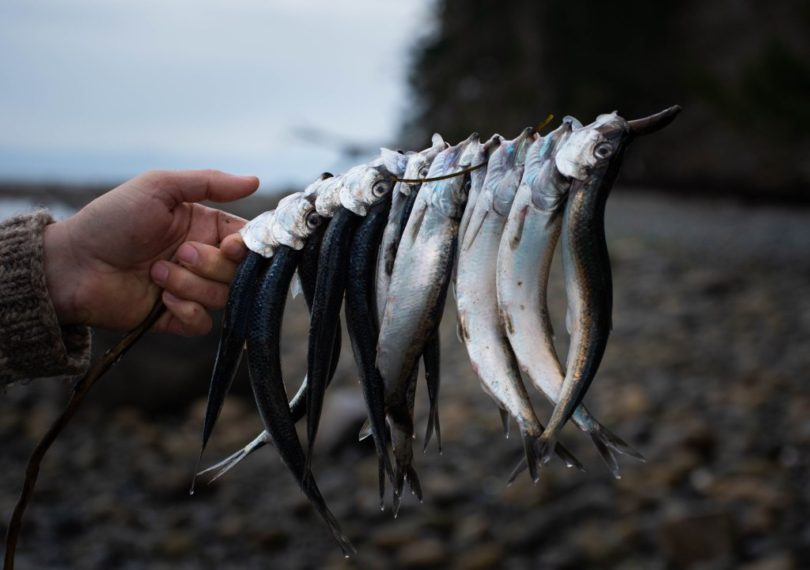Strait of Georgia Herring in Steep Decline
Published by Sea Shepherd Conservation Society
New DFO data validates concerns of First Nations and conservation groups, shows 60% decline in biomass since 2016.

(Coast Salish Territory/Strait of Georgia) International and local conservation groups are calling for an immediate closure of the herring fishery in the Strait of Georgia, after recently released data from the federal Department of Fisheries and Oceans (DFO) revealed the population biomass has dwindled from approximately 129,500 metric tonnes in 2016, to 85,700 tonnes in 2019, and is predicted to fall to 54,242 tonnes in 2020. This is a reduction of almost 60 percent in four years.
“The fact DFO can contemplate any commercial herring fishery on such reduced stocks shows their lack of leadership in conservation and recovery of the species”, stated Captain Locky MacLean, Director of Campaigns at Sea Shepherd, continuing, “We know how important herring is to the wildlife on this coast, the Americans were smart enough to shut herring fishing down in Puget Sound, we should be too.”
The herring population in the Strait of Georgia has endured years of excessive quotas, based on overestimated biomass calculated using a post-industrial fishing baseline. According to Victoria Postlethwaite, DFO’s Regional Herring Officer, the 2019 quota was set based on a predicted return of 122,291 tonnes, but only 85,700 tonnes returned. Fisheries ended up catching 25% of the population—exceeding the 20% harvest quota once again. The four other herring populations in B.C. have already collapsed in recent years due to overfishing.

On Friday, October 25, DFO released Commercial Fisheries Plans for the Food and Bait and Special Use fisheries, with recommended quotas of 500 short tons (453.6 metric tonnes) and 902 short tons (818.3 tonnes), respectively. The plan for the Roe fishery is expected in early December. According to a DFO representative, the department is discussing total harvest levels between 1,600 and 10,850 tonnes for 2020 with stakeholders. Stakeholders are defined by DFO as predominantly herring industry representatives and some First Nations.
It seems incredible to us that after liking the DFO modelling that allowed them to continue to overfish, the herring industry now doesn’t like it because it says the quotas should be drastically reduced. They can’t have it both ways.” Stated Grant Scott, Chair of Conservancy Hornby Island.
Additional data disclosed by DFO forecasts that not only will fewer fish be returning, but the population will consist of smaller and younger fish with lower reproductive capacity. Herring once spawned throughout the Strait of Georgia and Johnstone Strait, but only one area of spawn remains, located between Qualicum Beach and Comox. In their management approach, DFO does not address the severely reduced geographic range and historical abundance of herring in the Strait of Georgia.
“If DFO is serious about protecting endangered Chinook salmon populations and Southern Resident Killer Whales, the first step should be to protect what is left of their food supply”. Said Ian McAllister, Executive Director of Pacific Wild, continuing, “Shutting the herring fishery down to let stocks recover should be the first course of action.”
Conservancy Hornby Island and the Association for Denman Island Marine Stewards, headquartered at the epicenter of the remaining herring spawning grounds in the Northern Gulf Islands, Sea Shepherd Conservation Society, and Pacific Wild, are calling on the federal government to create a Pacific Herring Recovery Program for the Strait of Georgia and immediately close the fishery.
The conservation groups will co-host a forum with the W̱SÁNEĆ Leadership Council on November 7 in W̱SÁNEĆ territory to discuss strategies for restoring the abundance and distribution of herring populations in the Salish Sea, develop ideas for what management will look like moving into the future, and return benefits to local communities.
Read the full article at: https://seashepherd.org/2019/10/29/strait-of-georgia-herring-in-steep-decline/?utm_source=rss&utm_medium=rss&utm_campaign=strait-of-georgia-herring-in-steep-decline





